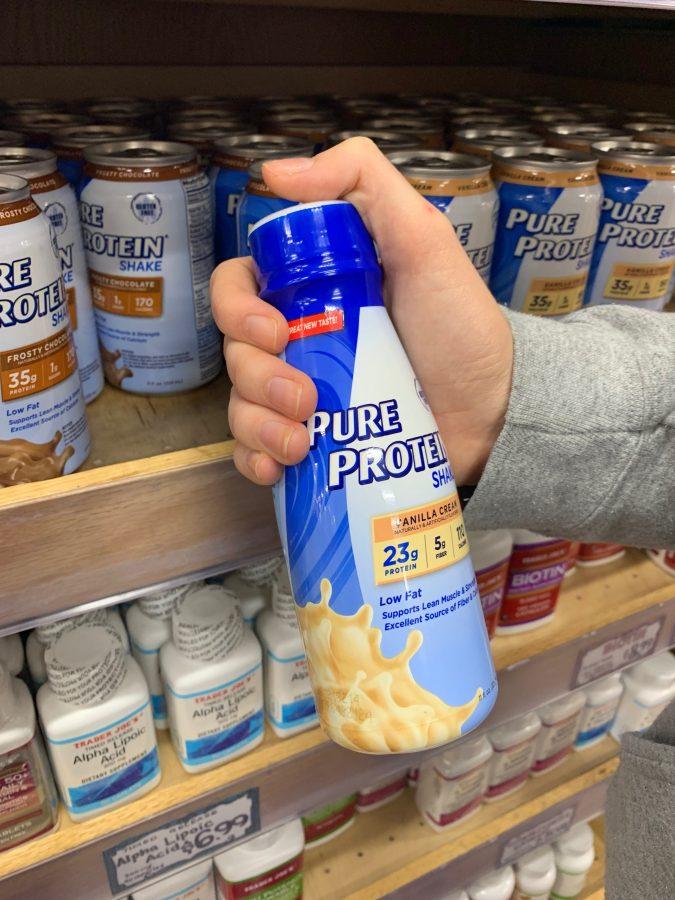Ever since I started playing basketball, many people have told me to give up and stop, since I was not expected to be tall,” said varsity basketball player and sophomore Annika Shah. “I knew I had to get stronger, because my predicted height wasn’t going to help me. I started doing everything. These things included going to the gym more often, eating healthier, or taking protein powder.”
In competitive sports, athletes aim to obtain and sustain a body based on the standards of the sport. To reach this goal, some professional athletes take supplements like creatine, beta-alanine, or whey protein. Protein supplements or protein powders added to foods, shakes, or smoothies are becoming a growing trend among high schoolers as well.
Jason Fung, Paly’s Physical Education teacher and ten-year bodybuilder, believes these supplements can be beneficial for athletes and nonathletes alike.
“Supplements should not be only for athletes. There is a good supplement for everyone — from kids all the way to grandparents. This is just an extra way to get protein into your system,”
Story continues below advertisementJason Fung
There are many forms of supplements, each of which serve a different purpose. Whey protein, contains essential amino-acids which are not produced by the body. This is the most common supplement used by teens. Healthline.com said whey protein can help increase strength through developing muscle mass, and at the same time reduce body fat.
“The main cause of taking these supplements is just to receive more protein and build muscle,” Shah said. “Also, I am vegetarian, so I need more protein since I don’t get any from meat.”
She takes the extra boost to fulfill the daily amount of protein that she needs as a growing teenager and an athlete. While some may argue that these products can be unhealthy and harmful, Shah extensively researched the product before purchasing it, and stands by her decision. She mentioned that she buys the best and healthiest product she can find so that she, as well as her parents, don’t have to worry about side effects.
In general, whey protein is beneficial for more than athletes, like individuals who exercise daily. Really, it can help anyone who struggles to get all the protein their daily diet requires.
Nutrition specialist Diana Schnee from clevelandclinic.org said protein is also beneficial for individuals who are underweight, picky eaters, or have a metabolic condition. Although these conditions are quite specific, one can take this supplement even if they don’t fall in any of these categories.
Overall, Paly students showed to be well informed regarding supplements. As senior Callum Day Ham said, a person’s body needs around 26 amino acids, but fails to produce nine of them.
“If your diet lacks any of these (amino acids), you won’t be able to grow as efficiently,” Day Ham said.
According to Day Ham, there are no downsides to these products as any excess is excreted in your urine and taking more can help supplement a lacking diet. Day Ham said he was able to grow his body in a pretty natural way by taking this product.
To remain healthy, Day Ham uses essential amino acids instead of branch chain amino acids (BCAAs) — which are a cheaper alternative.
Although Mr. Fung has a generally positive view about whey protein and supplements in general, he warns that cost and consistency in usage should be considered carefully. Cost can add up quickly when you take them regularly.
Taking protein for a month may not produce the effect one desires. Thus, most people consume it for an extended period of time. Also, Shah reinforced this idea when shedding light on how costly this habit can become.
“Protein powder is a high demand for many athletes, so it doesn’t come cheap, most are priced between $30-50, making it hard for a lot of people to purchase this product.”
Annika Shah
One concern of protein supplements are their side effects. Diana Schnee from Cleveland Clinic, also added that supplements like whey protein and essential amino acids can adversely affect teen’s health in three ways. First, it can lead to weight gain if calories are not burned off through exercise. Second, it can lead to organ damage when the kidneys work harder to filter out waste products. Lastly, supplements can cause problems in children with weak immune systems. Also, many supplements in the market do not label all their ingredients. Some contain stimulants or substances that can take a significant toll on anyone’s immune system.
Students interested in taking whey protein should follow Day Ham as he always consults with his doctor before taking any supplements.
Supplements can be a good complement for a healthy diet and bodybuilding. However, before taking them it’s important to understand the different types, their usage, and possible side effects.
It’s essential to inform yourself on what supplements do to your body and be conscious that it can give different effects on different people.
“Do some research on why you are taking it — not just because your favorite athlete is taking it,” Fung said.
Thie said, “I have always had a Paly coach that has cared for me not only as an athlete, but as a friend and as a role model.”

